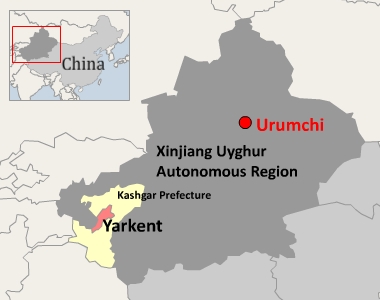




HONG KONG—Police in the northwesternmost corner of China have detained an ethnic minority Uyghur in connection with the stabbing death of a Han Chinese and the wounding of two others, one of them critically, officials say.
“We have detained the suspect, Obulkasim Omer, along with his wife and ex-wife,” Yarkent county police chief Eniver said in an interview. “One Han Chinese was killed and two were injured on Feb. 24.”
Obulkasim Omer, 38, was described as a businessman in Yarkent county, Kashgar prefecture—the westernmost part of the Xinjiang Uyghur Autonomous Region (XUAR), whose regional capital, Urumqi, erupted last July in deadly ethnic rioting between Han and Uyghur residents.

Gulbagh township is located just west of the Yarkent county seat.
“There are no signs so far of any group or organized crime involvement. It looks like just an isolated incident,” Su said, but added: “Of course it’s not an ordinary case—it was politically and ethnically motivated and ethnic hostility is the main factor.”
Obulkasim Omer had planned to kill more Han Chinese, Su said. “But his only weapon was a knife, and we have imposed tight security all over the region.”
Gulbagh Police Chief Wang Pao, who is handling the case, said Obulkasim Omer was self-employed, selling Shenzhen-made mobile phones in Yarkent, with excellent self-taught Mandarin Chinese.
Protest planned in July
“The attack is connected with the incident last July 10, after the Urumqi riots,” Wang said, but he declined to elaborate.
In December, Cambodia deported 20 ethnic Uyghur asylum-seekers who had fled to Cambodia after witnessing and documenting violent ethnic riots in Xinjiang that left nearly 200 dead by official count.
Seven of the 20 were Yarkent natives, who said local police surrounded and broke up a planned protest by Uyghur youths in Yarkent on July 10—days after the deadly violence in Urumqi.
“Even before their plan started, they were surrounded by police,” one of the Uyghurs said in appealing for asylum December. “One of them was shot and another was injured by police as they tried to run away.”
Wang, the police chief and investigating officer, declined to discuss the July 10 incident.
“The relatives of the Han Chinese victim already came for the funeral, and they are so upset. We tried to calm them down,” he said, without specifying what part of China they came from.
“Ethnic conflict could happen any time if we don’t control the Han Chinese neighborhoods where the victims live,” Wang said.
One of the victims is in critical condition at Kashgar Prefecture Hospital, after being treated for three days at Yarkent Hospital, he said.
Mirzehmet Mohammed, a former journalist on the Ili Evening News who now lives in Europe, blamed excessive security in the region for escalating tensions there.
“The Chinese authorities are worrying about ethnic relations, but the measures they’re taking to resolve this are all wrong,” he said.
Tight security
The regional Xinjiang government says it is doubling its security budget in 2010 and carrying out policies to encourage economic growth to alleviate tensions that led to the unrest last year.
Security remains tight in Xinjiang in the wake of the violence, with Internet and telephone services extremely limited for most of the region's 20 million people.
Uyghurs, a distinct and mostly Muslim ethnic group indigenous to Xinjiang, have long complained of religious, political, and cultural oppression under Chinese rule, and tensions have simmered there for years.
Xinjiang has been plagued in recent years by bombings, attacks, and riots that Chinese authorities blame on Uyghur separatists.
Original reporting and translation by Shohret for RFA’s Uyghur service. Uyghur service director: Dolkun Kamberi. Written in English by Sarah Jackson-Han.